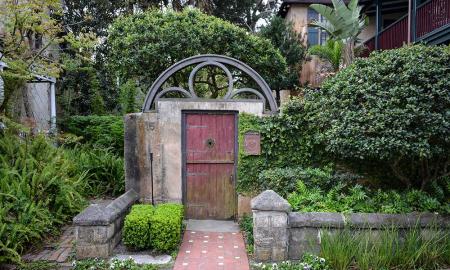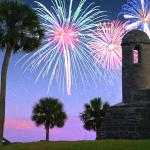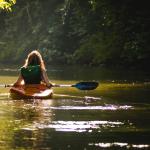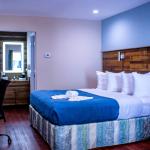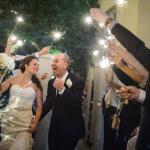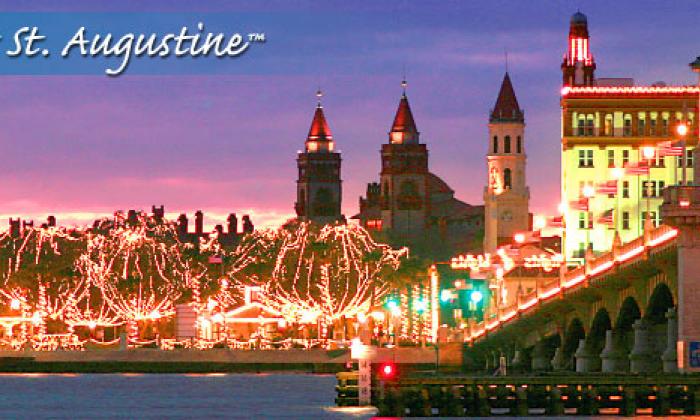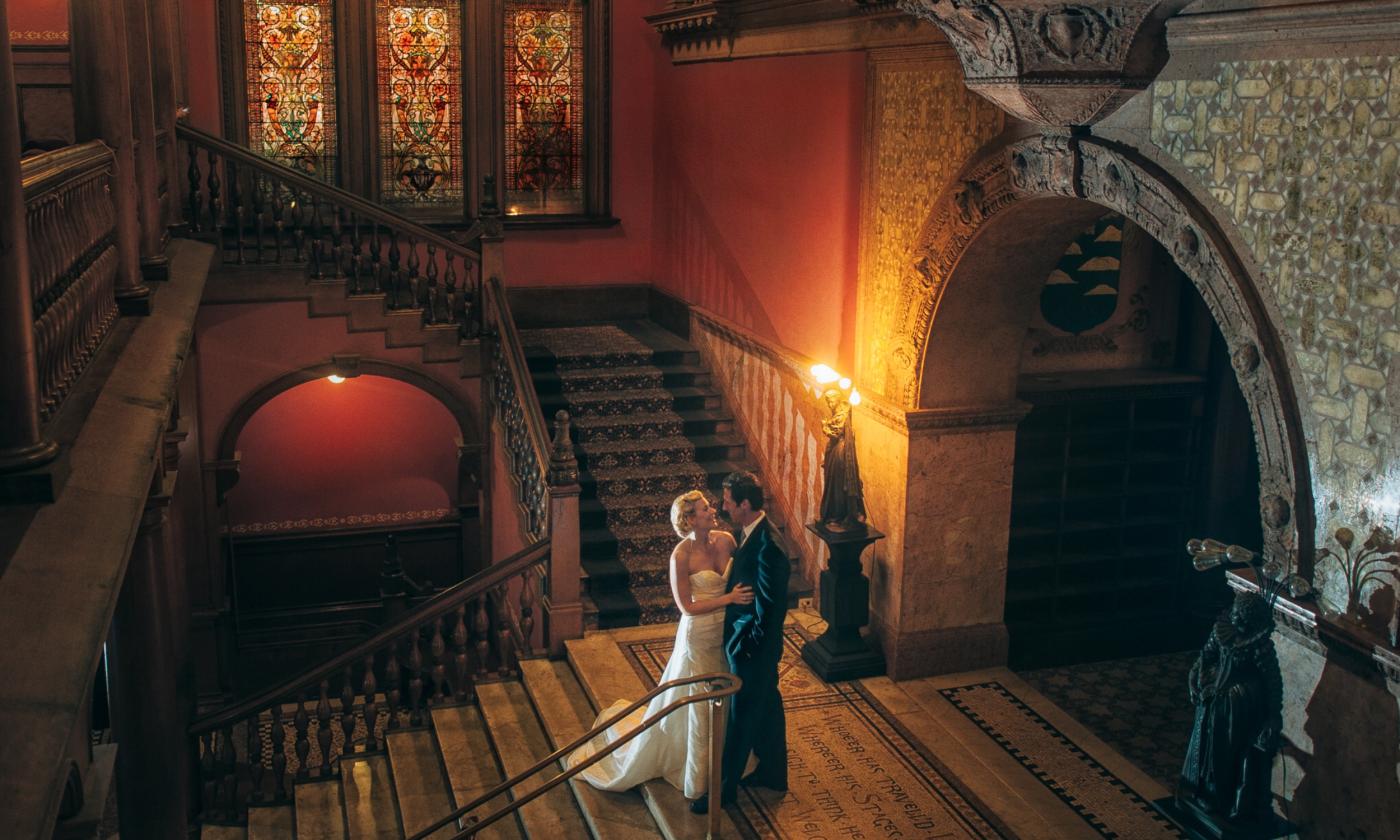
Top Historical Venues for Your Destination Wedding
Tie the knot in the city where history is found on every street.
Our downtown Historic District is no stranger to lovers. Brick streets and alleyways have witnessed many an embrace. Coquina mansions and regal live oaks have overheard many an “I do.”

In any season, lucky pedestrians can catch a glimpse of a bridal party strolling through the Plaza de la Constitución or along St. George Street (if it happens to be summertime, the bride is to be commended for her bravery). You might spot a newly married couple posing alongside Fiel and Firme, the valiant protectors of our Bridge of Lions. On an afternoon walk down Aviles Street (the oldest platted street in the country, by the by), you might hear the gleeful chatter of a rehearsal dinner in the Ximenez-Fatio House Museum Courtyard.
All this to say, St. Augustine’s charm as a wedding destination is rooted in its long and vibrant history.
Why choose a historic venue for your wedding?
Join a long tradition of matrimony.
Having been founded by the Spanish in 1565, the first Christian wedding on U.S. soil was officiated here in the Ancient City. The bride, Luisa Abrego, was a free Black woman who traveled to St. Augustine from Seville, Spain. Shortly after their arrival and the founding of the town (they had to get the boring stuff out of the way), Luisa married Miguel Rodriguez. (Their story is an exciting and rather dramatic one … but I digress.)
Since that first union, thousands of couples have tied the knot in the Ancient City. Through peacetimes and wartimes (of the latter there were many), marriage has remained a strong tradition in St. Augustine. Love, it seems, blooms regardless.
Discover unique photo opportunities.
As you explore the Downtown Historic District, St. Augustine’s diverse and historical architecture makes itself known with every step.

Historical Wedding Venues in St. Augustine
Since that first union, thousands of lovers have flocked to the "Ancient City" to walk down the aisle and tie the knot. Like each bride and groom, every wedding venue in St. Augustine is special and uniquely charming.
Below, you will find information about the history of these venues, as well as useful details like their capacity and services. And where better to start than the beginning?

The Fountain of Youth Archaeological Park — 1565
11 Magnolia Avenue
With a history dating back to our city's founding (September 8th, 1565), and a legend that was born in the 5th century, the Fountain of Youth is a poignant place to tie the knot.
History
It was upon these grounds that Pedro Menendez founded the city of St. Augustine. Before the Spaniards conquered La Florida, the indigenous Timucuans lived there for thousands of years. In the 1500s, their village was called Seloy.
Vibes
Rustic coastal charm characterizes the outdoor spaces at the Fountain of Youth, with marsh views, oak trees, and grapevine arbors. The Magnolia Room is a fresh, airy space with large windows, and a wood slat ceiling.

Venue Amenities
The Fountain of Youth Archaeological Park is made up of 15 acres of riverfront property (no, not the river of Bimini — the Matanzas River) with an air-conditioned indoor Pavilion called the "Magnolia Room" and more than 600 square feet of uncovered spaces.
Along with the grounds and event spaces, this venue also provides a private bridal suite and prep kitchen for caterers. Explore our wedding venue profile to learn more about what amenities the Fountain of Youth provides, like rentals and dressing rooms.
Capacity
The indoor events pavilion or "Magnolia Room" at the Fountain of Youth can hold 150 seated guests or 300 standing guests. However, because this is an operating attraction, daytime weddings are limited to 100 guests, and no food or drink is permitted.
Evening weddings can have a guest list of 300 max, with food and drink permitted.

Oldest House Museum Gardens — 1723
271 Charlotte Street
Under the care of the St. Augustine Historical Society, the outdoor event space at the Oldest House Gardens offers a picturesque setting for ceremonies and receptions.
History
The “oldest house” in question is formally known as the Gonzalez-Alvarez House, and it dates back to 1723. According to records at the Castillo de San Marcos National Monument, a Spanish soldier named Tomás Gonzalez y Hernandez lived in the one-story coquina house from 1727 to 1763, when the British Period (1764 - 1784) began.
From 1775 to about 1918, the various owners of the house expanded it to their tastes, resulting in a unique blend of Spanish, British, and American architectural styles (not unlike the city of St. Augustine itself!). It is now a part of the Oldest House Museum Complex and the St. Augustine Historical Society main headquarters.
Vibes
Picture the secret garden of your wildest Florida dreams. Within this private, walled courtyard, regal oak trees, lush greenery, and red brick paths create a charming antique air.
Venue Amenities
The Oldest House Gardens is a completely outdoor venue that can be transformed into a ceremony and a reception space.
Along with beautiful event areas and a private dressing room, the venue also offers wedding planning services.
Capacity
The Oldest House can accommodate 150 guests for receptions. For ceremonies, 250.
Click here to discover more about weddings at the Oldest House.

Colonial Quarter — 1700s
14 South Castillo Drive
The Colonial Quarter is a compound of attractions and restaurants and one of St. Augustine’s largest wedding venues.
History
This historical event venue occupies nearly a full block of St. Augustine’s infamous St. George Street. Now the central hub of shopping and attractions in our historic downtown, this section of the city was once one of the residential areas of San Augustin. The oldest building on the property is the De Mesa Sanchez House, which was built in 1740.
By day, this site is dedicated to sharing the colonial eras of St. Augustine’s history — that is, the first 250 years of it! Guests are invited to watch history come alive through living history demonstrations and engaging exhibits.
By night, the Colonial Oak Music Park is a bustling music venue where musicians often play full-band shows. This two-acre property is available for YOUR wedding experience, offering a wide range of services, sure to please pirates and princesses alike.

Vibes
This outdoor venue in the center of our Historic Downtown is sure to please pirates and princesses alike. Made of exposed wood, the colonial-style buildings create a quaint, rustic style throughout. The size of the Colonial Quarter compound, however, allows for more grandeur than other, smaller venues.
Venue Amenities
Along with the unique outbuildings on the property, the Colonial Oak Music Park amphitheater can also be used for ceremonies or entertainment. Along with planning packages, the staff at the Colonial Quarter offers many services, including customizable catering, event security, door greeters, bartenders, servers, and even a discounted tour of the nearby Pirate and Treasure Museum.

Capacity
Spanning two acres, the Colonial Quarter is one of the largest wedding venues in the city with a capacity of up to 175 people. However, smaller groups are invited to make use of the more intimate spaces on the property.
To explore your wedding at the Colonial Quarter, click here.

Peña-Peck House Museum — 1750
143 St. George Street
Called the “secret garden of St. George Street,” this outdoor venue dates back to the First Spanish Period.
History
Now a house museum that depicts an 1800s doctor’s home, the Peña-Peck House was originally built in 1750 to be the home of the Spanish Royal Treasurer, Juan Estevan de Peña.
Because of its location on St. George Street, this property has been occupied by several notable figures. In the 1770s, John Moultrie, Lieutenant Governor of East Florida (and a key player in the Revolutionary War on the British side) lived in this house.
In the 1830s, Dr. Seth Peck purchased the home and began making massive renovations to the property. Once complete, he moved into the second floor with his family. The first floor held Dr. Peck’s medical office as well as a general store. The home was occupied by Dr. Peck’s descendants until 1931, when it was gifted to the city of St. Augustine. It was opened as a museum in 1932 and has ever since been under the care of the Woman’s Exchange of St. Augustine.
Vibes
Weddings here are sure to bloom with antique charm. Palmettos, magnolias, and live oaks grow together in harmony throughout the Peña-Peck House garden. Along with trellises and well-manicured flower trees, these old trees cast cool shade over the walled courtyard, which has paved and grassy areas.
Venue Amenities
While this is a completely outdoor venue, the Peña-Peck House provides a bridal dressing room and optional tents. This wedding venue is only a few minutes’ walk from the Plaza de la Constitución, and dozens of St. Augustine’s most popular attractions and restaurants.
Capacity
For weddings and other private events, the Peña-Peck House can host up to 150 guests standing, and up to 125 seated.
To explore the Peña-Peck House's wedding services, click here.

The Ximenez-Fatio House Museum — 1798
20 Aviles Street
Located on the oldest street in America, this house museum has been opening its gates for weddings since 1834.
History
The Ximenez-Fatio House is a massive coquina mansion that has witnessed centuries of St. Augustine history. It was originally built in 1798 by Spanish merchant Andres Ximenez, who operated a general store on the first floor and lived with his family on the second floor. His young wife, Juana Pellicer, was the daughter of Minorcan liberator Francisco Pellicer.
After Florida became a United States territory in 1821, Andres and Juana’s living heirs sold the house to Charlestonian Mrs. Margaret Cook, who turned the building into a boarding home for the growing tourist crowd. Her manager, Mrs. Elizabeth Whitehurst, organized her daughter’s wedding, Ms. Anna Whitehurst, in 1834.
Mrs. Cook and Mrs. Whitehurst were the first in a long line of women who have owned and operated businesses at 20 Aviles Street. Miss Louisa Fatio, who managed “Madame Fatio’s Boarding House,” from 1851 until her death in 1875 was the most well known property manager.
The Ximenez-Fatio House Museum is still owned by women today, and offers historical tours through the museum, which is decorated as if it was still the 1800s.

Vibes
Bridal parties will spend their ceremonies and receptions at the Ximenez-Fatio House surrounded by the lush greenery, Spanish colonial style buildings, and coquina walls. String lights bring the property to life during evening events.
Venue Amenities
This venue is centrally located, but more private and quiet than other venues in Historic Downtown. It is outfitted for mostly outdoor events, with customizable reception and ceremony placement. Because the museum’s interior contains many historic artifacts, access is limited to photo sessions.
Along with the courtyard and grounds here, couples also have access to dressing rooms, recommended local vendors, and equipment rentals. Parties can also purchase private historic tours.
Capacity
The Ximenez-Fatio House can accommodate up to 100 wedding guests.
Click here to learn about weddings at the Ximenez-Fatio House.

Villa Zorayda — 1883
83 King Street
Built to mimic the ancient architecture of the Alhambra Palace in Granada, Spain, this museum invites eclectic couples to host their special day within this beautifully decorated space.
History
The Villa Zorayda was built in 1883 by Bostonian merchant Mr. Franklin W. Smith. Because of his interest in ancient civilizations, Smith used a method of poured concrete to construct what would become his winter home. The structure was so unique and sturdy against the Florida climate that Henry Flagler had his builders use this method to construct both the Ponce de Leon and Alcazar Hotels.
Smith hosted family, friends, and acquaintances in this building for 20 years. Public interest in the Villa Zorayda was so intense that the building was transformed into a restaurant and lounge called “The Zorayda Club” around 1903. The current owners, the Mussallem family, have been the stewards of the Villa Zoraida since their ancestor, Lebanese immigrant Abraham Mussallem, bought the property in 1913.

Vibes
Through the brightly painted doors of the museum, couples will find a colorful, densely decorated, and especially Spanish space. Moorish details shine through in the architecture, with horseshoe arches presiding over delicate columns.
Venue Amenities
Along with the vibrant decorations throughout the museum, this venue is also centrally located in downtown St. Augustine.
Elopement packages and larger ceremony The Villa Zorayda provides a bridal dressing room, set up / clean up services, a recommended photographer, and parking for ceremonies.
This is not a reception venue.
Capacity
This wedding venue is ideal for intimate ceremonies, with room for up to 60 guests.
Click here to learn about weddings at Villa Zorayda.

The White Room — 1888
1 King Street
Established as a wedding venue in 2006, the White Room offers some of the best views in the city.
History
The White Room is one of the many businesses that call 1 King Street home. Situated on the Plaza de la Constitución (the center of Spanish St. Augustine civic and religious activity) and facing the Matanzas Bay, this historic site has witnessed many important chapters of the city’s history.
The current building that houses the White Room was built in 1888 after the past structure had been burned down in an infamous fire. That same year, Henry Flagler had opened his notorious Ponce de Leon Hotel, and tourists were flocking to St. Augustine. 1 King Street became a department store offering dry goods and clothing. Throughout the 1900s, the building was home to several different general stores. Most notably, in 1949, it was the original Potter’s Wax Museum.
Vibes
The White Room transforms based on the tastes and choices of the couples getting married there. However, each and every wedding held here is sure to be unavoidably elegant. High ceilings (or no ceilings), bayfront views, exposed brick walls, and crystal chandeliers culminate in an unforgettable, high-class air.
Venue Amenities
With three different venues for ceremonies and receptions (the Grand Ballroom, the Villa Blanca, and the White Room Loft & Rooftop), the White Room is a stand-out full service venue located in the center of St. Augustine’s Historic Downtown. There are both outdoor and indoor spaces to choose from. Dressing Rooms can be provided for bridesmaids and groomsmen. Full-service meals and catering options are available, with executive chefs presiding over the entire process. Equipment rentals can also be arranged.
Capacity
Depending on the package and the space, this venue can accommodate 50 - 400 guests.
To start planning your White Room wedding, click here.

Flagler College / Ponce de Leon Hotel — 1888
74 King Street
An iconic presence in the city, the epic Ponce de Leon Hotel is the centerpiece of the venues offered by Grand Ponce Events & Weddings at Flagler College.
History
In 1888, oil magnate Henry Flagler opened the Hotel Ponce de Leon (lovingly called “Ponce” by students and locals). For decades, hundreds of America’s most glamorous and important figures filled the hallways to celebrate and experience the opulent Spanish architecture and services that were offered here. From the hotel rooms to the grand parlors, every room of this hotel was built to be luxurious. Henry Flagler spared no expense, even hiring the infamous Thomas Edison to wire the entire hotel with direct current wiring.

The 1900s saw many changes for Florida and the country in general. The hotel operated as normal until World War II, when it was closed for a time and used as a training base for the Coast Guard. After the war ended, the Coast Guard moved out and the hotel opened again. However, visitation was not as strong as it once was, and the dilapidated hotel was opened as Flagler College in 1968. The building was added to the National Register of Historic Places in 1975 and made a National Historic Landmark in 2006.
The Flagler College campus has since expanded throughout the city, now including several more historic homes and estates.
Vibes
Op-u-lence — opulence! In true Gilded Age (a term coined by Mark Twain to describe the late 1800s) style, each and every inch of the Ponce de Leon hotel is dripping with expensive, beautiful, historical details.
For couples who prefer a more toned-down vibe but are committed to having a wedding at Flagler College, Grand Ponce Events also hosts receptions and ceremonies in other spaces. The Crisp Ellert Art Museum boasts dark wood ceilings and modern Spanish details. The Markland House is an old plantation house with massive white columns and elegant details within.
Venue Amenities
There are several indoor and outdoor venues to choose from when booking with Grand Ponce Events & Weddings. Of course, the Hotel Ponce de Leon is the largest jewel in this collection. Within this historic landmark, couples can choose from the Grand Ballroom, the rooftop Solarium, and the Rotunda. Two other properties on Flagler College campus — the Crisp-Ellert Art Museum and the Markland House — can also be used for ceremonies and receptions.
Set up, clean up, parking, and a bridal suite are all included when you book this space. Catering, bar services, event planning, and vendor recommendations are also available.
This venue’s availability is based around Flagler College’s academic calendar, so scheduling must be done far in advance.
Capacity
The absolute maximum for this venue is 400 people.
However, each space within the Flagler College campus can accommodate a different amount of guests, depending on the preferences and tastes of any specific couple. Our Flagler College Weddings & Events page holds a complete run-down on this venue’s specifics.
Click here to find more information about weddings at Flagler College.

Lightner Museum — 1889
75 King Street
Once a resort hotel, the Lightner Museum invites history buffs to say “I do” in their unique venue spaces.
History
Originally called the “Alcazar Hotel,” the Lightner Museum was completed in 1888 alongside the Hotel Ponce de Leon. Henry Flagler, co-founder of Standard Oil, paid for both of them. He envisioned St. Augustine as a premier destination for wealthy northern tourists, and the Alcazar was a key element of that vision. It contained multiple spas, a bicycle path, and the largest indoor swimming pool of that era. The heyday of Flagler’s St. Augustine hotels was the 1890s. After several decades of decline, the Great Depression forced the Alcazar Hotel to close in 1931.
Sixteen years later in 1947, a Chicago collector named Otto Lightner bought the old hotel and began to transform it into a hobby museum. He filled each and every room with art and objects from his collection, including china, matchbooks, bronze, and wood carvings. Luckily, Mr. Lightner preserved many of the unique rooms within the hotel and they are still open for museum guests today.

Vibes
The Lightner Museum is an altogether unique wedding venue. Their beautiful artifact displays paired with Spanish Revival architecture create an elegant ambiance with an antique flare. Multi-level reception spaces make for grand events.
Venue Amenities
Featured as one of the “Top 10 Historic Wedding Venues in the Southeast” by Southern Bride magazine, the Lightner Museum offers both indoor and outdoor spaces for receptions and ceremonies. Those spaces are the historic pool, the connected mezzanine, the hotel’s grand lobby, and an outdoor terrace and garden.
Based on which package couples choose, this wedding venue can provide equipment rentals, customizable decorations, bar services, vendor recommendations, and wedding planning.
Capacity
The Lightner Museum can accommodate 40 to 225 guests for weddings and events.
To discover more about your destination wedding at the Lightner, click here.

Casa Monica Resort & Spa — 1888
95 Cordova St
On the corner of King and Cordova Streets, this historical wedding venue lies in the heart of St. Augustine’s Historic District.
History
With architecture inspired by the Spanish Baroque and Moorish styles, the Casa Monica Hotel was originally built by Franklin W. Smith, who also built the Villa Zorayda down the street. The Casa Monica debuted in 1888, competing with Henry Flagler’s iconic Ponce de Leon Hotel. Predictably, Flagler ended up on top while Smith floundered for several years, trying to keep the hotel afloat. Soon after the Casa Monica’s debut, Smith reached out to Flagler for assistance. Flagler bought the hotel and renamed it the Cordova Hotel.
Similar to the other two Flagler Hotels in this city, the “Cordova” Hotel was done in by the Great Depression and foreclosed in 1932. After sitting empty for nearly a generation, the building was turned into the St. Johns County Courthouse in 1968.
The Casa Monica Hotel reopened as a hotel in 1999 under the stewardship of the Kessler Foundation. It is the only “Flagler Hotel” in St. Augustine that still operates under its original purpose and has recently been renovated to better reflect the Moorish architectural details that were present in 1888.
Vibes
The Casa Monica provides a wedding experience the way Henry Flagler would have wanted it. Massive original paintings, Moorish columns, and elegant Moroccan details can be found all throughout this grand hotel.
Venue Amenities
With both indoor and covered outdoor spaces available, the Casa Monica Hotel offers couples a plethora of choices in planning their big day. Parking, set up, and clean up are provided, with equipment rentals, catering, and bar services available with certain packages.
Capacity
Depending on the space a couple uses, the Casa Monica can host 25 - 350 guests.
To start exploring weddings at the Casa Monica Hotel, click here.
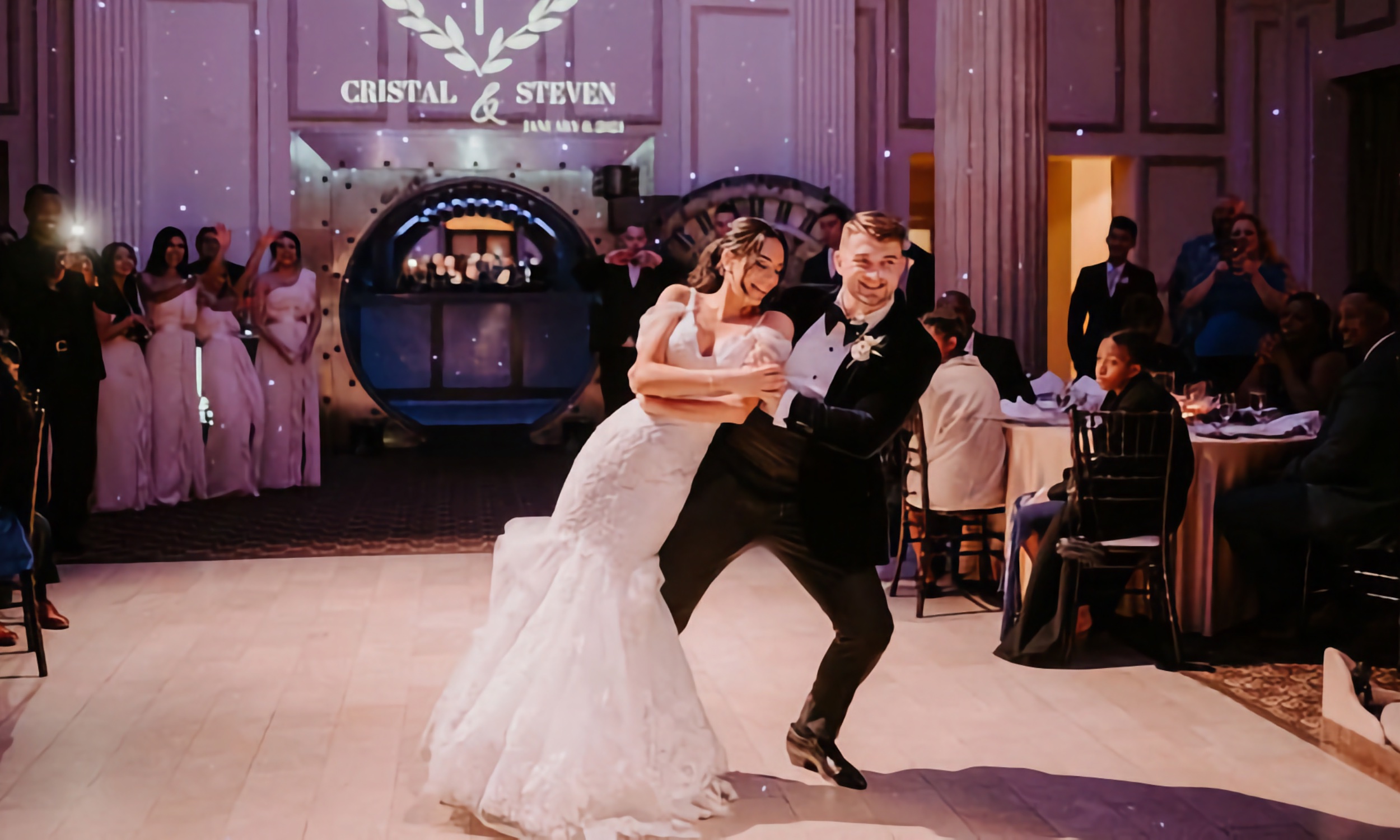
Treasury on the Plaza — 1927
24 Cathedral Place #111
Housed within what the locals call the “Treasury Building,” the Treasury on the Plaza wedding venue is a truly unique space brimming with art deco charm.
History
The epic building at 24 Cathedral Place was originally opened as the First National Bank of St. Augustine in 1927. Its striking architecture was designed by F.A. Hollingsworth, who favored Mediterranean styles and effected the appearance of many of St. Augustine’s iconic buildings.

The Treasury Building is now well known for being the tallest building in St. Augustine. Many of its historic features and stylings have been preserved to this day.
Vibes
Stately grandeur — white columns line the main hall, art deco details fringe each room, silver bank vaults swing open to reveal a cozy speakeasy with marble counters. From the entry hall to the private dressing rooms, Treasury on the Plaza is decorated to the nines. Color schemes and decorations can be customized.
Venue Amenities
Couples have access to several jaw-dropping spaces within the Treasury on the Plaza venue. For getting ready, there are private dressing rooms decorated for groom and bridal parties. The main reception and ceremony space is the Grand Ballroom, a large hall that can be decorated to a couple’s specific tastes. Perhaps the most unique space within the Treasury on the Plaza is the Vault Bar — a repurposed bank vault that now serves as a speakeasy.
Couples have access to a variety of services, including full service catering (drinks, dinner, deserts), wedding planning, and equipment rentals. Various packages are available on their website.
Capacity
The Treasury on the Plaza can accommodate up to 200 guests.
To learn all there is to know about Treasury on the Plaza, click here.
Conclusion
So there you have it — a list of historic places that open their doors to wedding parties. Each of the sites on this list offer distinct experiences to couples, and each has its own story to tell. Each of these venues is united in the 450+ year tradition of matrimony in St. Augustine.

If you still need some inspiration, click over to our Ancient City wedding dream board — here, you'll find a collage of beautiful images, amenities, and services for folks looking to get hitched in St. Augustine.

